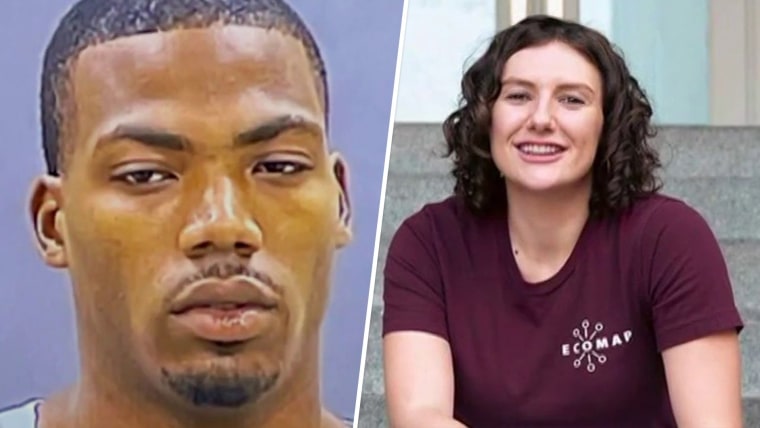The man accused of handcuffing and raping a woman at her Baltimore apartment days before police said he beat and killed Pava LaPere, a 26-year-old tech entrepreneur, had been released early from prison, despite having a violent past that included a conviction for a sex offense.
Jason Billingsley’s criminal history dates back to 2009 and includes charges of attempted rape, armed robbery and false imprisonment. In 2015, he was sentenced to 30 years in prison after a woman told police that he held her at knifepoint, strangled her, and forced her to perform oral sex on him, according to court documents.
Under a plea agreement, however, 16 of those years were suspended, leaving Billingsley to serve 14 years behind bars. Then in October 2022, five years ahead of his scheduled release, he walked out of prison a free man.
“Rapists shouldn’t be let out early. Period.”
said baltimore mayor brandon scott
Billingsley was let out of prison under Maryland’s diminution credit system, a policy that allows inmates to reduce the term of their incarceration through such things as good behavior and completing educational courses. Thirty-eight states have similar programs on the books. The violent and repetitive nature of Billingsley’s crimes, however, have left many wondering why he was eligible for the credits and if he should have been released at all.
Baltimore police also initially did not tell the public about the rape days before LaPere’s killing, prompting even more questions about whether her death could have been prevented.
“Rapists shouldn’t be let out early. Period,” Baltimore Mayor Brandon Scott said at a news conference Thursday, where he also called Billingsley a “sociopath.” “When you rape someone—no matter if it’s someone’s daughter, son, their wife— you should not get out early, period, for that kind of offense.”
The crimes
On Wednesday night, less than a year after his release, Billingsley was arrested in the slaying of LaPere and the sexual assault of another woman. LaPere was found Monday at her Baltimore apartment strangled and viciously beaten with a brick, court documents state. Her body was half-clothed, according to the documents which did not offer details about the nature of the crime.
Days earlier on Sept. 19, Billingsley allegedly raped a woman multiple times and slit her throat before dousing her and a man with liquid and setting them on fire, documents state.
But that wasn’t Billingsley’s first run-in with the law.
In 2013, a woman told police that she had gotten into an argument with her boyfriend and was walking down the street in Baltimore when she stopped to sit on some steps, according to the court documents. She said a man she knew as “Jason” approached her and asked what was wrong and if she had a place to stay.
“When she told him she did not, he offered to let her stay with him at a nearby location,” the documents state. “She agreed to go with him and the two walked to an unknown house.”
The woman said she and Billingsley sat and talked in a bedroom, according to the documents. When he said he wanted to have sex with her, she stated that she wanted to leave. Billingsley then hit the woman in the face, started to choke her and threatened to shoot her if she didn’t do what he said, the documents show. Billingsley, armed with a knife, forced the woman to perform oral sex on him before stealing $53 from her wallet, according to the documents. He then told her to leave.
Billingsley faced several charges including first-and second-degree assault, attempted first-degree rape, armed robbery, false imprisonment and theft of less than $100, court documents show.
In 2010, Billingsley was also accused of punching an ex-girlfriend in the face, pinning her down and stealing her phone, other court documents state. He pleaded guilty the following year to assault.
And in 2009, he was arrested following allegations he and another suspect robbed a man of $10. Court records state that the alleged victim’s nose was bleeding when he spoke to police. Billingsley pleaded guilty in that case, the documents state, noting that he later violated his probation.
‘Good conduct credit’
Under the system that let Billingsley out of prison early, inmates receive “good conduct credit” automatically at intake “subject to the inmate’s future good behavior,” a 2020 state report says. The credits are described as a “behavioral incentive” and a way to reduce overcrowding at prisons.
The other credits are earned throughout the prisoner’s incarceration period. Inmates who have satisfactory progress in or complete various courses and therapy can receive monthly education credits, the report says. Those who participate in assigned job duties can get monthly work credits. Inmates can also shave time off by earning credits for doing “special selected work projects or other special programs,” the report states. It’s not clear what type of credits Billingsley had earned.
Stacey Lee, a professor of Law and Ethics at the Johns Hopkins University Carey Business School, said the policy makes sense, in theory, because prisons are overcrowded and understaffed.
“However, if you are a violent offender your access to the number of credits you can get is supposed to be limited,” she said.
Given Billingsley’s past, Lee doesn’t think he should have ever been eligible to receive credit for an early release, despite not violating any of the provisions that would make him ineligible.
“To me, he didn’t seem like a good candidate,” Lee said.
“To me, he didn’t seem like a good candidate,” Lee said.
said stacey Lee, a professor of law and ethics
Under the current guidelines, criminals sentenced for first- or second-degree rape or sex offense against a victim under 16 or repeat offenders who committed a third-degree sex offense against a victim under 16 are not eligible. An inmate who violated lifetime sexual offender supervision is also ineligible.
“I get that it allows us to empty the prisons a little faster but when it results in them being readmitted and causing more harm once they’re released, I have a problem with that,” Lee added.
David Jaros, a criminal law professor and faculty director of the Center for Criminal Justice Reform at the University of Baltimore School of Law, also supports the system. He thinks the credit system allows inmates to “take part in programming and work programs that actually contribute to their rehabilitation.”
“And it contributes to the safety of the prisons themselves,” he said. “The safer they are, ultimately the safer the public is because the more we traumatize people while they’re inside, the more likely dangerous people are going to be coming back out onto the streets.”
Jaros said he understands that the diminution credit system will now come under intense scrutiny because of the horrific nature of what happened but doesn’t think it should impact the policy.
“It is easy to say that this is someone who should never see the light of day, but we don’t know who that person is that should never see the light of day. There are people who get out and are rehabilitated who then become active members of their community,” he said. “I think the wrong takeaway here is that the problem is diminution credits.”
Source: | This article originally belongs to Nbcnews.com












